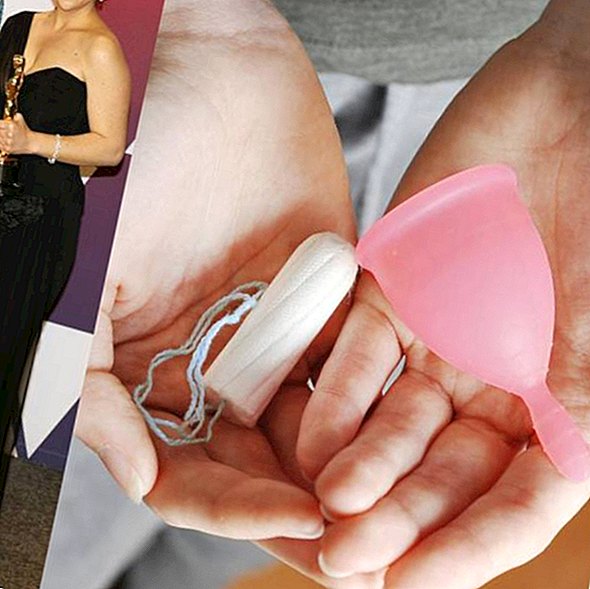World Women's Day: The zero-waste opportunities during the period

Sustainable and conscious living, this motto is becoming more and more important for many young women. But there is one problem that stands in the way of zero-waste everyday life: the monthly period. Finally, for routine hygiene, there is an increasing use of disposable products that can not be recycled but simply end up in the garbage and consume many resources during manufacture. A garbage-free menses is now but possible: We show the World Women's Day 2019, the zero-waste alternatives to conventional tampons and pads.
menstrual cups
These colorful cups are now available in every well-stocked drugstore to buy: Menstrual cups are probably the best known way to bleed sustainably and environmentally friendly. There are the cups, which are made in most cases of silicone, from various manufacturers and in different sizes and colors. The cups of brands such as Fun Factory, for example, are completely produced in Germany and are vegan, because they are made of medical grade silicone.
Although she has to try something out until she has found the perfect variant for herself, then the advantages outweigh the benefits: a menstrual cup is stable for between five and ten years, can be worn for up to twelve hours and can usually be cleaned with water , When the menstrual period is over, it is boiled in a hot water bath and can then be reused in the next cycle.
Organic Tampons
It continues with tampons. Like, tampons? Correct reading, because there are now also numerous brands such as the start-up The Female Company from Stuttgart, the organic tampons made of organic cotton, which is grown and processed without chemicals and pesticides. Produced in Spain. For each completed subscription, toiletries will be donated to women in German refugee homes.
The pioneer of this concept is the US start-up Lola. Both companies emerged from the question of why tampon manufacturers actually do not have to identify the ingredients of the products on the packaging. Conventional tampons are usually made of viscose - and little environmentally friendly. Who does not want to do without tampons, should therefore switch to organic.
Menstruationsschwämmchen
A natural product as an alternative to the traditional (soft) tampon: menstrual sponges from real natural sponges. Sounds unusual, but is just as effective and produces less waste. Those who feel a great desire for sex during their period will be happy with this hygiene product. The so-called Levantine sponge is wet, wrung and inserted into the vagina. Due to the fine pores, the sponge can absorb large quantities of liquid, which is released only when it is expressed. According to users, the sponge feels neither the wife nor the partner in the traffic. The sponge is cleaned with running, cold water.
Washable or biodegradable bandages
"I can not believe that a movie about menstruation won an Oscar," said director Rayka Zehtabchi when she was awarded the Golden Boy for her documentary short film "Stigma Monthly Bleeding." The short documentation accompanies an Indian women's group as they learn to produce inexpensive and biodegradable sanitary napkins. A revolution, because in India, girls and women are often isolated during their period, for some it even ends school attendance.
Reusable, biodegradable sanitary napkins are a wonderful alternative to traditional sanitary products. If you have a lot of time and muse and are passionate about sewing, you can make the pads out of cloth yourself. Manufacturers like Kulmine, on the other hand, offer models made of organic cotton. The fabric bandages, which are usually to be closed with a push button, are used as conventional bandages. After use, it is best to rinse with cold water and then clean at 60 degrees in the washing machine.
Period Pants
Underpants with integrated bandage: period pants have conquered the market of hygiene products in recent years. Pioneer in the field is the US company Thinx. Period lingerie designers have come up with the idea of creating beautiful panties that use a special technology to absorb moisture, fight bacteria, are waterproof and can absorb as much blood as one or two tampons.
These two founders are also making a stand for disadvantaged countries: For every Panty sold, seven washable panty liners are donated to a non-profit organization. Since 2018 there is also a German brand called ooshi, which produces period pants.
Free bleeding
Free bleeding is a trend that causes different reactions.It means "free menstruation" and means the abandonment of any hygiene products. It is probably the most environmentally friendly zero-waste method that can be used during the monthly bleeding, but also the one where the woman has to deal with most of her body. The movement is celebrated mainly in feminist circles, which demand an open approach to the female cycle and a de-tabooing of the period. During menstruation, a woman bleeds at intervals, so anyone who listens to his body and finds out how he has timed can go to the bathroom in time. Sensitivity to the body signals is required here.










